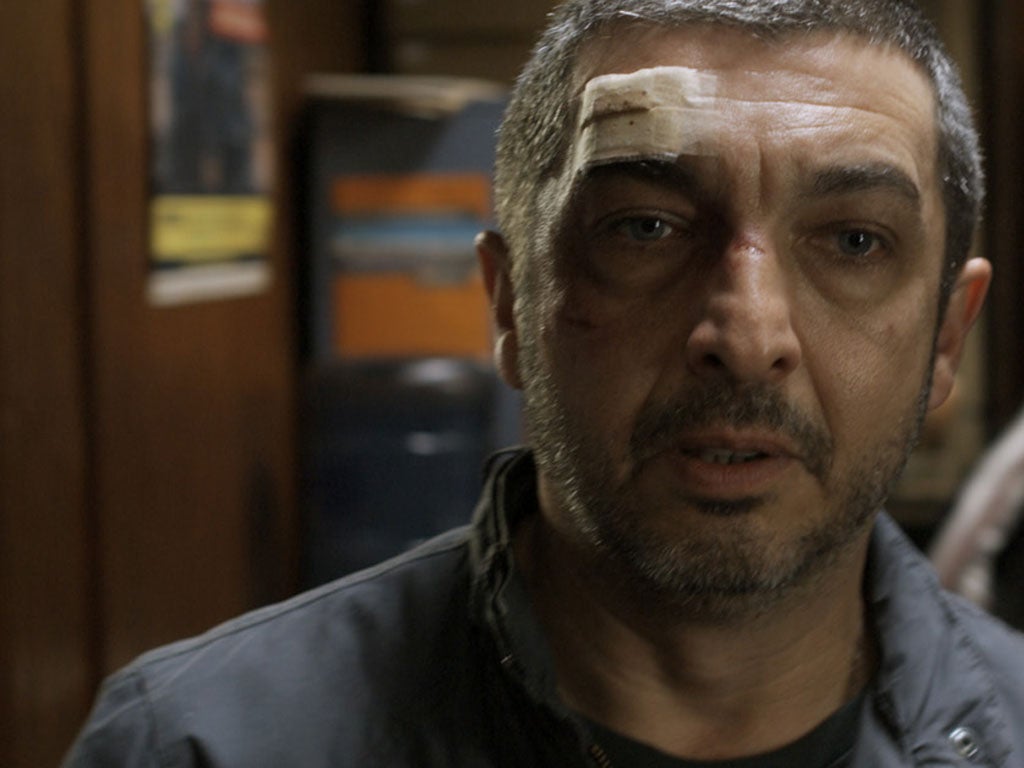Carancho, Pablo Trapero, 94 mins (12A) Wanderlust, David Wain, 98 mins (15) This Means War, McG, 94 mins (12A)
If you don't want to get tangled up with The Vulture, better fasten your seatbelt ...

Opening with some scary statistics about the high rate of traffic accidents in Argentina, Carancho then introduces two people who, in very different ways, work with the victims of those accidents. Martina Gusman is a young paramedic who scrapes them off the pavements of Buenos Aires and into ambulances every night. The other, Ricardo Darin, chases those ambulances. Darin, the eagle-nosed, hamster-cheeked star of The Secret In Their Eyes, is a lawyer who specialises in compensation claims. His clients are grateful for the money, not realising that Darin's company pockets 80 per cent of it. Carancho translates as "The Vulture".
Pablo Trapero, the director of Familia Rodante and Lion's Den, has hit upon the perfect film noir setting, and the perfect film noir protagonist. Scouting funeral parlours and emergency rooms for business, Darin is a Bogart-ish anti-hero who walks a fine line between legality and crime, and who sees being beaten up by aggrieved associates as an occupational hazard. Beneath his crumpled exterior, of course, he has a heart of gold, and when the beautiful Gusman steals it, he vows to get out of his dirty business. He just needs to complete one last job. What could possibly go wrong?
The vivid, grimy details of Darin and Gusman's nocturnal work are a good deal more distinctive than conventional hard-boiled plotting, and there won't be many thrillers this year that pack a bigger, more teeth-rattling punch. One thing's for sure: no one who sees Carancho will drive home from the cinema without fastening their seatbelt.
There are two Hollywood comedies out this week, both funnier on paper than on film. The more bearable of the two is Wanderlust, which stars Jennifer Aniston and Paul Rudd as dyed-in-the-wool New Yorkers who can no longer afford their cupboard-sized Manhattan "micro-loft".
They're forced to move in with Rudd's brother in Atlanta, but he proves to be so obnoxious that they flee to a nearby hippy commune called Elysium. It's not a bad fish-out-of-water premise, even if it could have been written 30 years ago, but the film spends so much time in Manhattan and Atlanta that most of the Elysium scenes are squeezed into a montage, and an awfully predictable montage at that. When you think of hippy communes, you think of drugs, nudism, free love and acoustic guitars. The screenwriters thought of exactly the same things.
Rudd and Aniston are never less than engaging, and Justin Theroux's turn as a swaggering guru should elevate him to leading-man status. But they're stuck with a screenplay that uses its best jokes in the opening scenes (and the trailer), and has such a rickety plot that it resorts to a TV news report to tie up its storylines at the end.
Still, it's not nearly as confused as This Means War, an action movie/romantic comedy hybrid which stars Chris Pine and Tom Hardy as two CIA buddies who both fancy the same woman, Reese Witherspoon, and who use their high-tech surveillance equipment to find out her likes and dislikes. It doesn't occur to either of them that they could just ask her.
The film could have been a comment on 21st-century romance, with all its opportunities for paranoid cyber-snooping, but instead it just churns out repetitive scenes of Pine and Hardy sabotaging each other's dates, interspersed by repetitive scenes of Witherspoon whinging about how conflicted she is. It's hard to know who is more objectionable: the creeps who misuse government resources, or the woman swayed by their ever-more ludicrous stunts.
Join our commenting forum
Join thought-provoking conversations, follow other Independent readers and see their replies
Comments